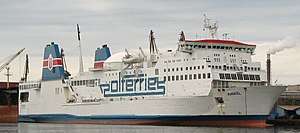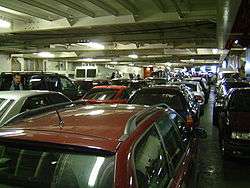MS Wawel
MS Wawel is a ferry launched in 1979 as the Scandinavia.[3] She spent a large part of her career serving the Dover-Calais cross channel ferry route with successive operators. She is currently in service with Polferries as the Wawel.
 | |
| History | |
|---|---|
| Name: |
|
| Port of registry: |
Nassau, |
| Builder: | Kockums Varv AB, Sweden [1] |
| Yard number: | 569 [1] |
| Launched: | 1 December 1979 [2] |
| Identification: |
|
| General characteristics | |
| Tonnage: | 8,919 gross register tons (GRT) [1] |
| Length: | 163.51 m (536.5 ft) [1] |
| Beam: | 23.04 m (75.6 ft) [1] |
| Draught: | 28.4 m (93.2 ft) [1] |
| Propulsion: | 2 x Sulzer 7RLA56 [1] |
| Speed: | 19 kn (35.2 km/h) [1] |
Early years
The Wawel started life as the Scandinavia, ordered by and for Rederi AB Nordö, Malmö for services in the Eastern Mediterranean. She was launched at the Kockums Varv AB shipyard in Malmö, Sweden on 1 December 1979 [2] and delivered to Rederi AB Nordö on 17 March 1980, opening a service between Koper, Yugoslavia and Tartous, Syria [4] in April 1980. On 7 June 1980, the Scandinavia's sister ship, Zenobia capsized on her maiden voyage roughly 2 km away from Larnaca, Cyprus, this precipitated the end of Rederi's Yugoslavia to Syria service.[4] In April 1982 the two remaining vessels Scandinavia and her sister Ariadne were sold to Bulgarian So Mejdunaroden Automobile Transport (SOMAT) and the Scandinavia was renamed Tzarevetz.[2] Under SOMAT ownership, the Tzarevetz was operated using the MedLink brand running trans-Mediterranean services until 1984 when she was chartered back to Rederi AB to run a service between Greece and Italy. A further charter in 1987 saw her transfer first to the Baltic Sea, and then later in 1988 a brief charter running a service in the North Sea for DFDS.[2] In November 1988, both the Tzarvetz and her sister, which had been renamed Trapezitza [5] were sold to Sealink British Ferries.[2]
Sealink to Stena
Following the purchase by Sealink British Ferries she was renamed to Fiesta and undertook some charter work in Africa. After only a few trips, the Fiesta's crew resigned due to worries over piracy near Lagos, Nigeria and she was consequently laid up in the Fal.[4] Sealink eventually decided to use the two vessels, in a pooling agreement with SNCF to provide a joint service running between Dover and Calais.[4] As a result of this decision, the Fiesta and her sister, now named Fantasia were sent to Lloyd Werft, Bremerhaven in June 1989 to be converted from freight carriers to passenger carriers.[4] As part of the pooling agreement, the Fantasia was to be given to SNCF, as a result of this, whilst at Bremerhaven, the two vessels swapped names.[4] The Fantasia returned to Dover on 8 March 1990, her owners had in the meantime been acquired by Stena Line. The joint services were renamed initially to Sealink Stena Line, under the new branding, in October 1990 it was announced that the Fantasia would become the Stena Fantasia.[4]
In December 1990 she was sent to A&P Appledore for a major overhaul following maneuverability issues and bow visor problems at Calais on 2 December, returning just after Christmas with her new name.[4] Ongoing maneuverability issues resulted in a starboard hole following her spending 8 hrs pinned against the mooring quay in Dover during bad weather on 8 January 1991. She was sent to Rotterdam for repairs and at the same time her stern was adjusted to make it compatible with the docks at Calais.[4] The maneuverability issues were not finally fixed until a further refit in Gothenburg beginning 6 November 1991 [4] returning to Dover-Calais service in December 1991.
In 1993, the Stena Fantasia became the first cross-channel ferry to carry a McDonald's restaurant, having been installed during a refit at Bremerhaven that year.[4] In July 1995 SNCF announced their intention to withdraw from the pooling agreement which had been set up in 1989 to operate a new service under the name of SeaFrance from 1996. As a result of this, Stena Sealink Line dropped the 'Sealink' to become Stena Line as of 31 December 1995.[2] The Stena Fantasia continued service with Stena Line and transferred on 10 March 1998 to the newly formed joint venture of P&O Stena Line with the merger of P&O European Ferries and Stena Lines eastern channel routes.[6] As a result of this change, and the new companies attempt to merge the two fleets, the P&O Stena 'Brand World' was rolled out across the fleet, this included the renaming of all vessels in the new fleet, Stena Fantasia consequently became P&OSL Canterbury during her December 1998 refit.[7]
Under P&O Stena Line P&OSL Canterbury continued the Dover-Calais route, on 11 August 1999 she was hired out on charter to the Daily Mail to enable passengers to view the European Solar Eclipse.[7] This era was not without fault, with further bow door problems in April 2000 and flooding of a machine room in May 2001 causing her to be taken out of service for repairs both times.[7] In October 2002, P&O bought Stena Lines' 40% share in P&O Stena Line and the vessel was speedily renamed PO Canterbury, then returning after her winter refit as the Pride of Canterbury for a short service in Spring 2003.[7] In mid-May 2003, Pride of Canterbury was laid up in Dunkirk awaiting disposal, thus ending her 13 year career on the Dover-Calais route.[7] She was sold to GA Ferries of Greece in October 2003 but did not depart until March 2004.[7]

Post P&O
In March 2004, the new owners GA Ferries renamed the vessel to Alkmini A, operating a service between Igoumenitsa, Greece and Brindisi, Italy from June 2004,[3] this however was not to last and in September 2004 the Alkmini A was sold to Polferries and transferred to the Baltic Sea as the Wawel [8] operating a route from 15 February 2005 [2] between Swinoujscie, Poland and Ystad, Sweden.[8] In October 2008 she was chartered to DFDS to continue this route, both DFDS and Polferries now operate this route in collaboration.[8]
Sister ships
The Wawel had one sister ship;
- SeaFrance Cézanne - Scrapped in Alang India, October 2011.
References
Notes
- "M/F Wawel". Ferry-site.dk. Retrieved 21 June 2010.
- "Fantasia". DoverFerryPhotos.co.uk. Archived from the original on 12 September 2007. Retrieved 21 June 2010.
- "Fantasia". SimplonPC.co.uk. Retrieved 21 June 2010.
- "Fantasia Part One". HHVFerry.com. Retrieved 21 June 2010.
- "SeaFrance Cezanne". SimplonPC.co.uk. Retrieved 21 June 2010.
- "Report into the Merger of P&O and Stena Line AB". Monopolies and Mergers Commission. Archived from the original (PDF) on 18 March 2010. Retrieved 23 June 2010.
- "Fantasia Part Two". HHVFerry.com. Retrieved 23 June 2010.
- "Fantasia Part Three". HHVFerry.com. Retrieved 23 June 2010.
Bibliography
- Hendy, John (1990). Fantasia. Staplehurst, Kent: Ferry Publications. ISBN 0951350625.
External links
![]()
